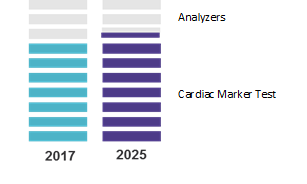Cardiac POC Testing Devices: A Rapid Resulting Diagnostic Healthcare Test
Cardiac POC testing is a heart-related diagnostic test, which is carried out at or near the point-of-care of a patient. POC testing is a blood diagnostic test involved in detection of cholesterol and blood coagulation. This diagnosis helps physicians to examine the risk of developing thrombosis and extreme bleeding inside blood vessel, which leads to cardiac arrest. Moreover, cardiac POC includes troponin and brain natriuretic peptide analysis test to identify cardiovascular disorders such as coronary artery disease, myocardial infarction, and heart failure. Cardiac POC test significantly lowers time consumed in extracting data/reports. In most cases, diagnosis reports are provided within an hour after the submission of test samples. Thus, cardiac POC tests help reduce turnaround time noticeably, allowing instant patient response and effective management of cardiac diseases.
According to the World Health Organization (WHO) 2016, one-third of ischemic heart disease cases are observed due to high cholesterol levels. Increase in cholesterol and blood coagulants in blood arteries, are estimated to cause cardiac disorders. For instance, according to WHO, 2016, over 2.5 million deaths and around 29 million individuals were recorded to be suffering from cardiac disorders. The cardiac POC testing device provides easy-to-use system with the correct assessment of cholesterol levels and heart ailments.
The global cardiac POC testing market is estimated to be valued at US$ 2,104.1 million in 2017 and is expected to witness a CAGR of 7.1 % during the forecast period (2017 – 2025).
Figure 1. Global Cardiac POC Testing Devices Market Share, By Product Type (%)

To learn more about this report, Download Free Sample
Increasing prevalence of cardiac disorders significantly drives growth of the cardiac POC testing devices market
According to the FH Foundation, a patient-centered organization devoted to research and education of Familial Hypercholesterolemia (FH), 2015, 1 in 200-500 people suffered from familial hypercholesterolemia worldwide. With increasing population, this number expected to increase in the future, thereby leading to growth in demand for testing cholesterol levels in individuals. This in turn, is expected to propel the overall growth of the cardiac POC testing devices market. According to the World Health Organization 2013, around 33.5 million of the global population was estimated to have suffered from coronary artery disease, a major condition leading to heart attack. The growing prevalence of cardiovascular ailments is expected to increase the demand for cardiac POC testing devices, in turn, driving growth of the market. Additionally, The Patient Protection and Affordable Care Act, called Obamacare, was implemented under the Hospital Readmissions Reduction Program (HRRP), by the U.S. government in 2015 to impose penalties on hospitals. According to the penalty, the government had reduced up to 1-2% in the Medicare payment per patient, for hospital readmission within 30 days. This reduces the cost for diagnosis, in turn, accelerating growth of the cardiac POC testing devices market.
Increasing purchasing power and high prevalence are factors fueling growth of the cardiac POC testing device market
Rise in the geriatric population, associated with high susceptibility to chronic diseases related to cardiac disorders, and economical diagnosis of chronic diseases in rural areas are expected to boost growth of the global market. The cardiac POC testing devices market in Asia Pacific is expected to experience rapid growth over the forecast period, due to growing population and increasing purchasing power of patients. The key players are executing new strategies such as mergers and acquisitions, product launch, and medical symposium for better exposure of their products and to increase market share. The new product launch, collaborations between manufacturers, hospitals, and academic institutions are expected to establish a positive impact on the market growth. For instance, the global healthcare company, Abbott Laboratories has launched a software firmware in July 2017, which is embedded in the cardiac testing device. Moreover, Abbott Laboratories has acquired cardiac device maker, St. Jude Medical, at the stock deal of US$ 25 billion. The collaboration aims to produce a significant amount of new medical devices centered on patients suffering from cardiovascular disorders.
Share
Share
Missing comfort of reading report in your local language? Find your preferred language :
Transform your Strategy with Exclusive Trending Reports :
Frequently Asked Questions
Select a License Type
Joining thousands of companies around the world committed to making the Excellent Business Solutions.
View All Our Clients